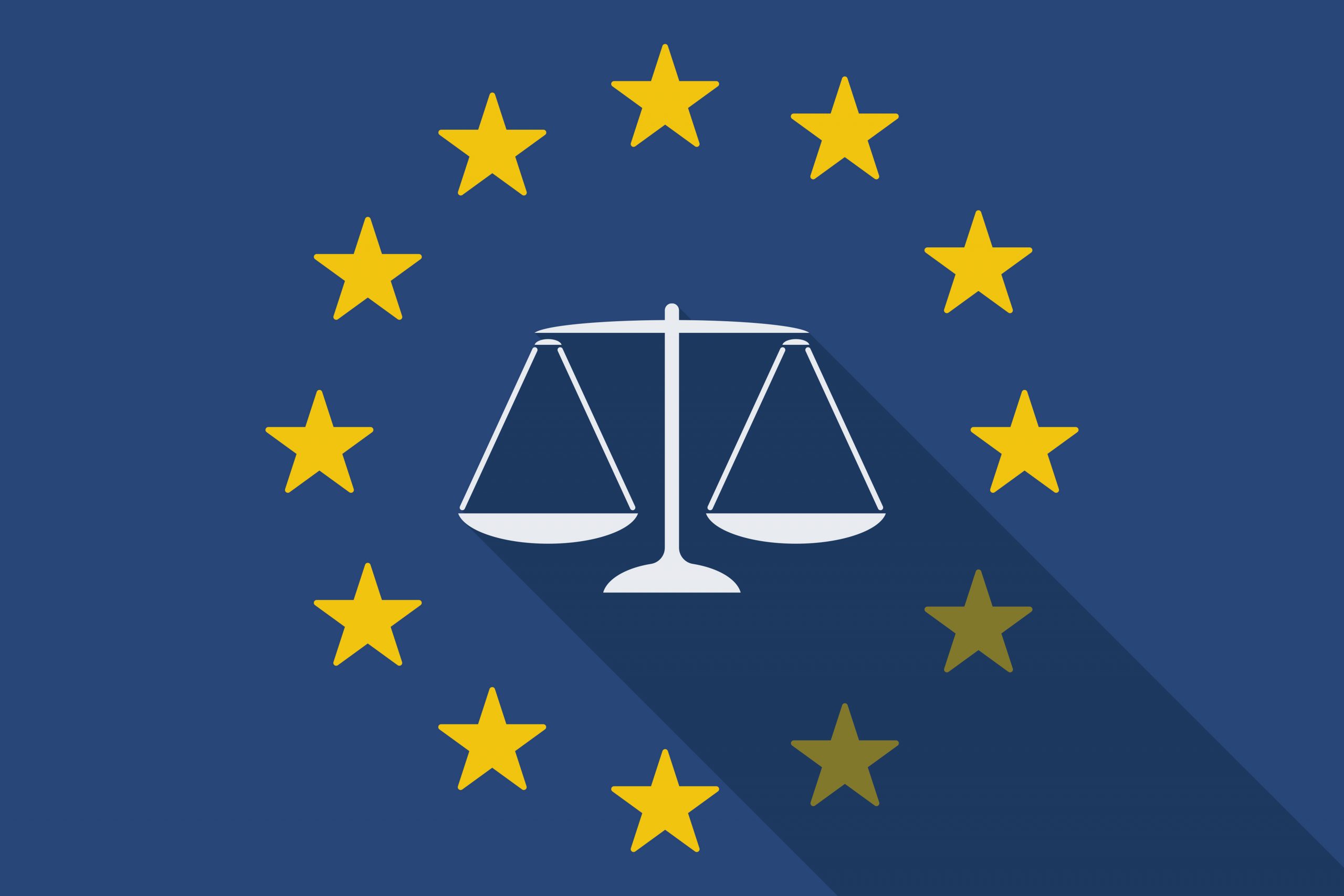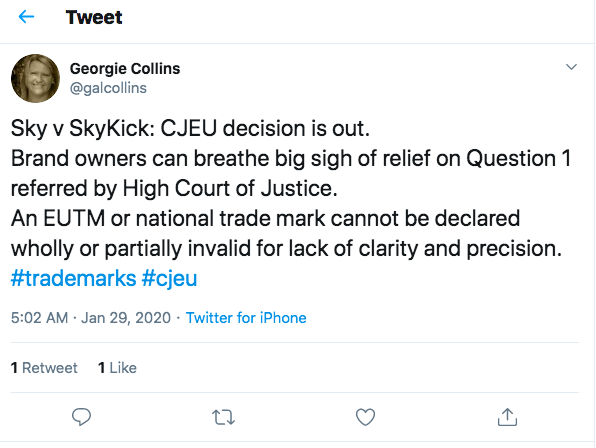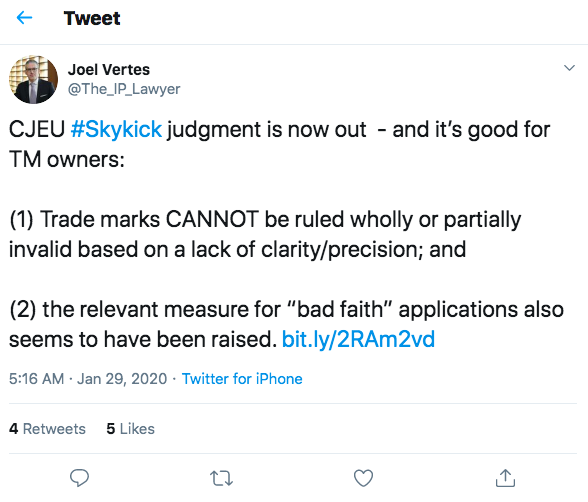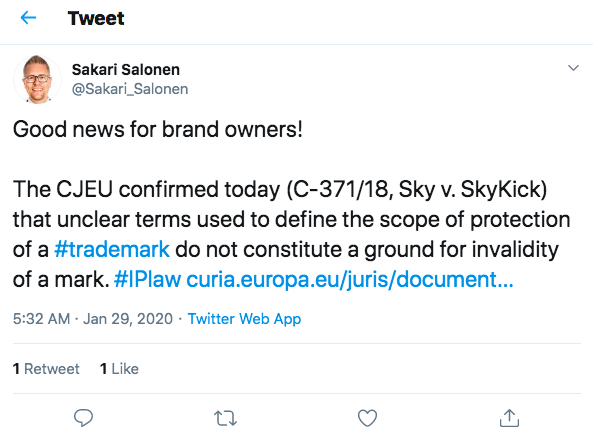While the CJEU has not gone as far as the Advocate General, the Skykick judgment “will give people a pause for thought when filing broad specifications and they will be a bit more reasonable, which is moving a little bit towards the U.S. system,” said Peter Brownlow of Bird & Bird.
 The Court of Justice of the European Union (CJEU) has provided reassurance to European trademark owners in its judgment today in the SkyKick case. (Case C?371/18 Sky plc, Sky International AG, Sky UK Limited v SkyKick UK Limited, SkyKick Inc.)
The Court of Justice of the European Union (CJEU) has provided reassurance to European trademark owners in its judgment today in the SkyKick case. (Case C?371/18 Sky plc, Sky International AG, Sky UK Limited v SkyKick UK Limited, SkyKick Inc.)
The case involves questions referred from the UK in a dispute over SkyKick’s alleged infringement of five of Sky’s EU and UK national trademarks. Sky is a well-known broadcaster and telecoms services provider, and SkyKick is a cloud services provider.
Clarity and Precision, and Bad Faith
As is common in Europe, Sky’s registrations covered a large number of goods and services, some of them quite broad, such as “software” in Class 9 and “Internet portal services” in Class 38. Before the Court, SkyKick challenged the validity of the registrations on two main grounds: (1) the marks were registered in respect of goods or services that were not specified with sufficient clarity and precision, and (2) the marks were registered in bad faith because Sky did not intend to use them in relation to all the goods and services covered by the registration.
In April 2018, the High Court in London submitted five questions to the CJEU. In October 2019, Advocate General Tanchev published his Opinion in the case, which led to some concerns that many EU trade marks could be at risk of cancellation. (The case was one of IPWatchdog’s five to look out for in Europe in 2020.)
However, the Court has not gone as far as the Advocate General, which will reassure owners of trademarks in Europe.
Court Steps Back from Brink
First, the Court noted that the case must be decided under the old EU legislation, namely Regulation No 40/94 and Directive 89/104, based on the date when the relevant trademark applications were filed. This explains why the judgment refers to Community trademarks rather than EU trademarks.
On the first issue, the Court stated that “a lack of clarity and precision of the terms designating the goods or services covered by a trade mark registration cannot be considered contrary to public policy, within the meaning of those provisions” and that therefore the lack of clarity and precision in a specification is not a ground for invalidity: “a Community trade mark or a national trade mark cannot be declared wholly or partially invalid on the ground that terms used to designate the goods and services in respect of which that trade mark was registered lack clarity and precision.”
Regarding the bad faith question, the Court took a somewhat nuanced view. It said, following the Advocate General, that registering a mark “without any intention to use it” may constitute bad faith “where there is no rationale for the application for registration.” But it added:
Such bad faith may, however, be established only if there is objective, relevant and consistent indicia tending to show that, when the application for a trade mark was filed, the trade mark applicant had the intention either of undermining, in a manner inconsistent with honest practices, the interests of third parties, or of obtaining, without even targeting a specific third party, an exclusive right for purposes other than those falling within the functions of a trade mark.
Bad faith cannot therefore be presumed based on a finding that, at the time of filing, the applicant had no economic activity corresponding to the goods and services.
Moreover, the Court said that if the lack of intention to use concerns only certain goods or services, the mark could only be invalidated for those goods or services.
Finally, the Court said that the Directive does not preclude national laws from requiring trademark applicants to state that a mark is being used or that there is an intent to use, as long as that requirement is not a ground for invalidity of a mark already registered.
A Small Move Towards the U.S. Trademark System?
Initial reaction from trademark lawyers was positive. On Twitter, Georgie Collins of Irwin Mitchell said: “Brand owners can breathe big sigh of relief … An EUTM or national trade mark cannot be declared wholly or partially invalid for lack of clarity and precision.”

Joel Vertes of CMS said: “it’s good for TM owners: (1) Trademarks CANNOT be ruled wholly or partially invalid based on a lack of clarity/precision; and (2) the relevant measure for ‘bad faith’ applications also seems to have been raised.”

And Sakari Salonen of Castrén & Snellman tweeted: “Good news for brand owners! … unclear terms used to define the scope of protection of a trademark do not constitute a ground for invalidity of a mark.”
 Speaking to IPWatchdog, Peter Brownlow, a partner of Bird & Bird, said the judgment does go some way to address concerns about “clogging up” in the EU system: “In simple terms, we’re moving a little bit towards the U.S. system where you have to show use or an intention to use. The CJEU have lowered the bar for what amounts to bad faith … It will give people a pause for thought when filing broad specifications and they will be a bit more reasonable, which is moving a little bit towards the U.S. system.”
Speaking to IPWatchdog, Peter Brownlow, a partner of Bird & Bird, said the judgment does go some way to address concerns about “clogging up” in the EU system: “In simple terms, we’re moving a little bit towards the U.S. system where you have to show use or an intention to use. The CJEU have lowered the bar for what amounts to bad faith … It will give people a pause for thought when filing broad specifications and they will be a bit more reasonable, which is moving a little bit towards the U.S. system.”
Mark Nichols, an associate at Harbottle & Lewis, told IPWatchdog the judgment will be welcomed by proprietors of trademarks with wide specifications or those specifying computer software, financial services or other broad terms:
The CJEU held that bad faith applies as usual to trade mark applications—if objective, relevant and consistent evidence shows that at the date of application the applicant for a trade mark had a bad faith intention in applying for the mark, then that mark may be invalid in whole or in part. The judgment is clear that if bad faith only extends to aspects of a trademark (for example, if its specification deliberately overreaches with a view to obstructing the business of a third party), then only those aspects of the trademark may be invalidated.
Brownlow agreed that many trademark owners would be relieved at the decision: “Larger business in telcos and financial services in particular were worried about facing a slew of cancellation actions, which might include hearings with evidence and cross-examination.” The SKY case will now return to the UK courts, which will have to apply the CJEU’s guidance.
More to Come
Bad faith is at the heart of several trademark disputes in Europe at the moment, perhaps reflecting concerns about cluttering of the system. One case concerns Hasbro’s EUTM registration for MONOPOLY, which was partially invalidated by an EUIPO Board of Appeal on the grounds that it covered the same goods and services as an earlier registration. The Board found that there was “no commercial logic” to this strategy and it was done purely to avoid having to prove genuine use of the earlier mark. Hasbro’s appeal in the MONOPLOY case is pending at the EU General Court and is expected to be heard later this year.
Image Source: Deposit Photos
Vector ID: 76007985
Copyright: jpgon

![[IPWatchdog Logo]](https://ipwatchdog.com/wp-content/themes/IPWatchdog%20-%202023/assets/images/temp/logo-small@2x.png)

![[[Advertisement]]](https://ipwatchdog.com/wp-content/uploads/2024/04/Patent-Litigation-Masters-2024-banner-early-bird-ends-Apr-21-last-chance-938x313-1.jpeg)
![[Advertisement]](https://ipwatchdog.com/wp-content/uploads/2024/04/Patent-Litigation-Masters-2024-sidebar-early-bird-ends-Apr-21-last-chance-700x500-1.jpg)

![[Advertisement]](https://ipwatchdog.com/wp-content/uploads/2021/12/WEBINAR-336-x-280-px.png)
![[Advertisement]](https://ipwatchdog.com/wp-content/uploads/2021/12/2021-Patent-Practice-on-Demand-recorded-Feb-2021-336-x-280.jpg)
![[Advertisement]](https://ipwatchdog.com/wp-content/uploads/2021/12/Ad-4-The-Invent-Patent-System™.png)







Join the Discussion
No comments yet.